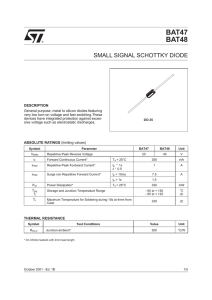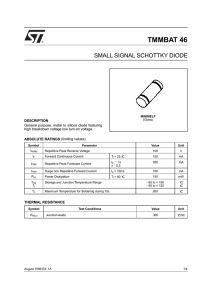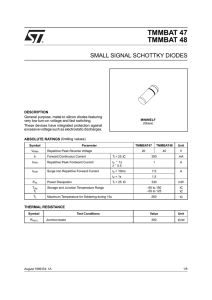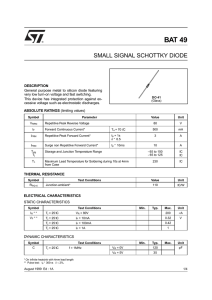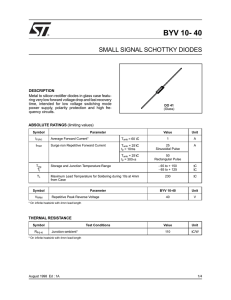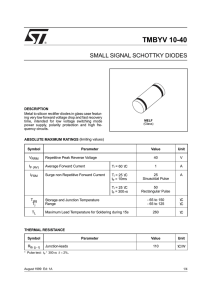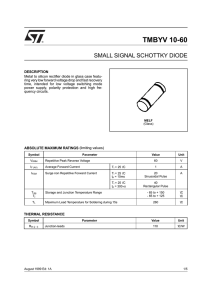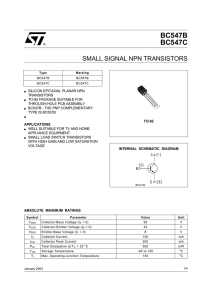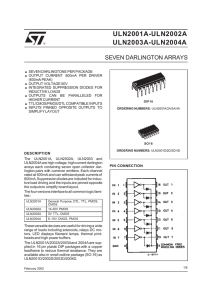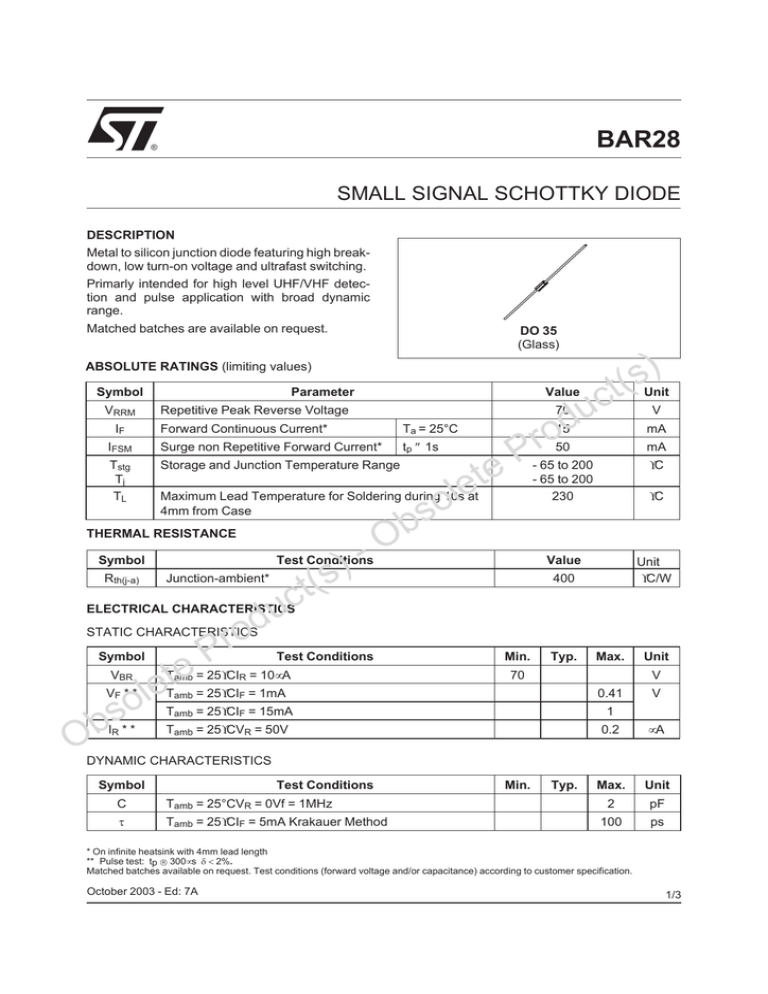
BAR28
®
SMALL SIGNAL SCHOTTKY DIODE
DESCRIPTION
Metal to silicon junction diode featuring high breakdown, low turn-on voltage and ultrafast switching.
Primarly intended for high level UHF/VHF detection and pulse application with broad dynamic
range.
Matched batches are available on request.
DO 35
(Glass)
ABSOLUTE RATINGS (limiting values)
Symbol
VRRM
IF
Parameter
Repetitive Peak Reverse Voltage
70
Forward Continuous Current*
Ta = 25°C
IFSM
Surge non Repetitive Forward Current*
tp ≤ 1s
Tstg
Tj
TL
Storage and Junction Temperature Range
Symbol
Rth(j-a)
(s)
b
O
-
Test Conditions
ct
Junction-ambient*
u
d
o
V
50
mA
- 65 to 200
- 65 to 200
230
°C
°C
Value
Unit
°C/W
P
e
let
so
Unit
d
o
r
15
Maximum Lead Temperature for Soldering during 10s at
4mm from Case
THERMAL RESISTANCE
uc
Value
)
s
t(
400
mA
ELECTRICAL CHARACTERISTICS
r
P
e
STATIC CHARACTERISTICS
Symbol
t
e
l
o
Min.
Typ.
Max.
VF * *
Tamb = 25°CIF = 1mA
0.41
Tamb = 25°CIF = 15mA
1
Tamb = 25°CVR = 50V
0.2
µA
Max.
Unit
2
pF
100
ps
IR * *
70
Unit
Tamb = 25°CIR = 10µA
bs
O
Test Conditions
VBR
V
V
DYNAMIC CHARACTERISTICS
Symbol
Test Conditions
C
Tamb = 25°CVR = 0Vf = 1MHz
τ
Tamb = 25°CIF = 5mA Krakauer Method
Min.
Typ.
* On infinite heatsink with 4mm lead length
** Pulse test: tp 300µs δ < 2%.
Matched batches available on request. Test conditions (forward voltage and/or capacitance) according to customer specification.
October 2003 - Ed: 7A
1/3
BAR28
Fig. 1: Forward current versus forward voltage at
low level (typical values).
Fig. 2: Capacitance C versus reverse applied
voltage VR (typical values).
c
u
d
Fig. 3: Reverse current versus ambient temperature.
)
s
(
ct
u
d
o
r
P
e
t
e
l
o
s
b
O
2/3
o
s
b
O
-
e
t
le
)
s
t(
o
r
P
Fig. 4: Reverse current versus continuous reverse voltage (typical values).
BAR28
Cooling method : by convection and conduction
Marking: clear, ring at cathode end.
PACKAGE MECHANICAL DATA
B
A
note 1 E
B
/C
O
E note 1
/D
O
O
/D
note 2
DIMENSIONS
REF.
Millimeters
c
u
d
NOTES
Inches
)
s
t(
o
r
P
Min.
Max.
Min.
Max.
A
3.050
4.500
0.120
0.117
1 - The lead diameter ∅ D is not controlled over zone E
B
12.7
∅C
1.530
2.000
0.060
0.079
2 - The minimum axial lengh within which the device may be
placed with its leads bent at right angles is 0.59"(15 mm)
∅D
0.458
0.558
0.018
0.022
E
0.500
e
t
le
)
s
(
ct
1.27
0.050
o
s
b
O
-
u
d
o
r
P
e
t
e
l
o
Information furnished is believed to be accurate and reliable. However, STMicroelectronics assumes no responsibility for the consequences of
use of such information nor for any infringement of patents or other rights of third parties which may result from its use. No license is granted by
implication or otherwise under any patent or patent rights of STMicroelectronics. Specifications mentioned in this publication are subject to
change without notice. This publication supersedes and replaces all information previously supplied. STMicroelectronics products are not authorized for use as critical components in life support devices or systems without express written approval of STMicroelectronics.
s
b
O
The ST logo is a registered trademark of STMicroelectronics.
All other names are the property of their respective owners.
© 2003 STMicroelectronics - All rights reserved.
STMicroelectronics GROUP OF COMPANIES
Australia - Belgium - Brazil - Canada - China - Czech Republic - Finland - France - Germany Hong Kong - India - Israel - Italy - Japan - Malaysia - Malta - Morocco - Singapore - Spain Sweden - Switzerland - United Kingdom - United States
www.st.com
3/3

